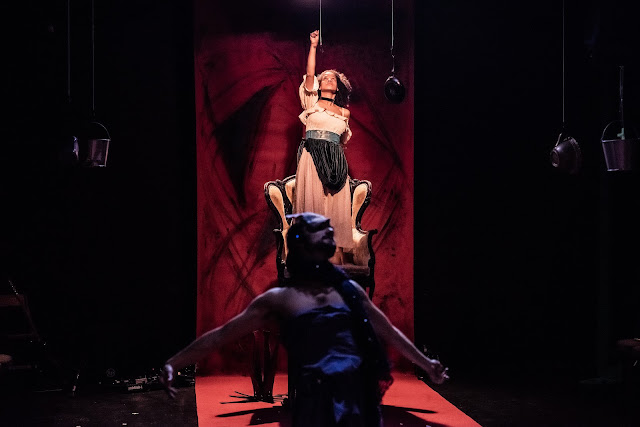My Onliness
Text and lyrics by Robert Lyons (from Witkacy)
Directed by Daniel Irizarry
Composer: Kamala Sankaram
September 6-24, 2022
 |
| Daniel Irizarry. Photo by Suzanne Fiore Photography |
Late in
My Onliness, a character known only as the Writer (Rhys Tivey) asserts, "The absurdity of life in-and-of-itself" is "something you won't see / on the stage of any theater." What we have seen to that point doesn't much support that claim, but then, the Writer himself observes that people require that their truths be wrapped in fiction or ceremony. The Writer is no favorite of the king (Daniel Irizarry)–the royal Onliness of the play's title–but artists and intellectuals are seldom beloved of authoritarians, and the king claims to both rule over and suffer for his subjects entirely on his own. If the Writer comes into conflict with the king merely by virtue of being "literary," Morbidita (Cynthia LaCruz), who delivers a (rather lengthy) petition to My Onliness early on, represents a more purposeful opposition. Playwright Robert Lyons identifies
My Onliness, available in a new
collection of Lyons's plays from Mercer Street Books, as an "homage" to Polish artist and writer Stanisław Ignacy Witkiewicz (1885-1939), who adopted the name Witkacy. Witkacy often used absurdism in his work, and he also wrote on the theory of "pure form" in the theater: he believed that "the metaphysical disquietude" produced by questions about existence "was essential to enable the creative process to produce a unity of pure form" that would cause audiences to "perceive the artist’s 'heightened metaphysical feeling' in a sense related to their own individual condition. They participate in this unity and become part of it, identifying with the form" (Barlow 110).* The irresistibly energetic and immersively inventive
My Onliness offers no shortage of absurdism (you might find the need to use a phrase like "graceful lobster" in discussing the production) or metaphysical disquietude (Morbidita, for instance, sings of the hideousness of the "very fact of existence" and the tiresomeness of awareness), and the spectator's participation is not only merely a matter of identification but is often made literal.
 |
| Rhys Tivey (left). Photo by Suzanne Fiore Photography |
While there may be only three characters as such, the feeling is always one of plenitude, even of joyous excess. Part of this is due to the additional onstage presence of musicians (Joanie Brittingham and Drew Fleming); Court Mediums (Dickie Hearts and Malik Paris) who provide ASL interpretation as well as dance and other performance elements; and, on occasion, one or more members of the audience. Part of it is also the committed physicality of the performances–Irizarry, for example, is, as always, a force of nature unto himself–and the way that the entire performance space is folded into the show: you might realize, say, that someone has been scrawling things on the wall behind you while your attention was elsewhere. The set design puts one in mind of the great hall of a palace, a long rectangular space with an elevated throne at one end, like something out of a John Tenniel illustration (especially given that the king is a red king). This layout emphasizes the audience's doubling as subjects, and contributes to the show's insistent erasure of the separation between audience and performer/performance (it is fitting that the first action is a kind of offstage call to assembly).
 |
| Cynthia LaCruz (top). Photo by Suzanne Fiore Photography |
My Onliness is interlaced with songs, though calling it a "musical" seems too prescriptive, and they range eclectically in flavor from jazz, country, and a cappella to rock and opera. The objects that become fodder for performance are equally varied: chalk, coins, a disco ball, popcorn, and an adventurous plastic chicken, to name a few. Tivey's Writer is often a comic figure, but his vocal performance is no joke, and LaCruz is similarly impressive whether she is crooning a ballad, inciting revolt, or using an enchanted doll against her nemesis. Endings are a motif here, and the show's ending may also be a beginning, but one earlier song about repetition suggests that this beginning could just be the start of another variation of the same situation, like any regime change. The king, who is the sort of leader to says that knowledge and thinking would prevent him from acting, promises his subjetcs a new, better existence; but says that they must endure torture and humiliation to get there. But while that might be bad news for, say, the Writer, it's extraordinarily entertaining for the audience. Reducing
My Onliness to some sort of descriptive prose seems to run counter to the ethos of a show that puts such emphasis on embodied presence and experience, so, instead, we'll just say: go have this marvelous experience for yourself.
-John R. Ziegler and Leah Richards
* Quotation from John D. Barlow, "Witkiewicz's Theory of Pure Form and the Music of Morton Feldman."
The Polish Journal of Aesthetics, vol. 31, no. 4, 2013, pp. 109-120.






Comments
Post a Comment